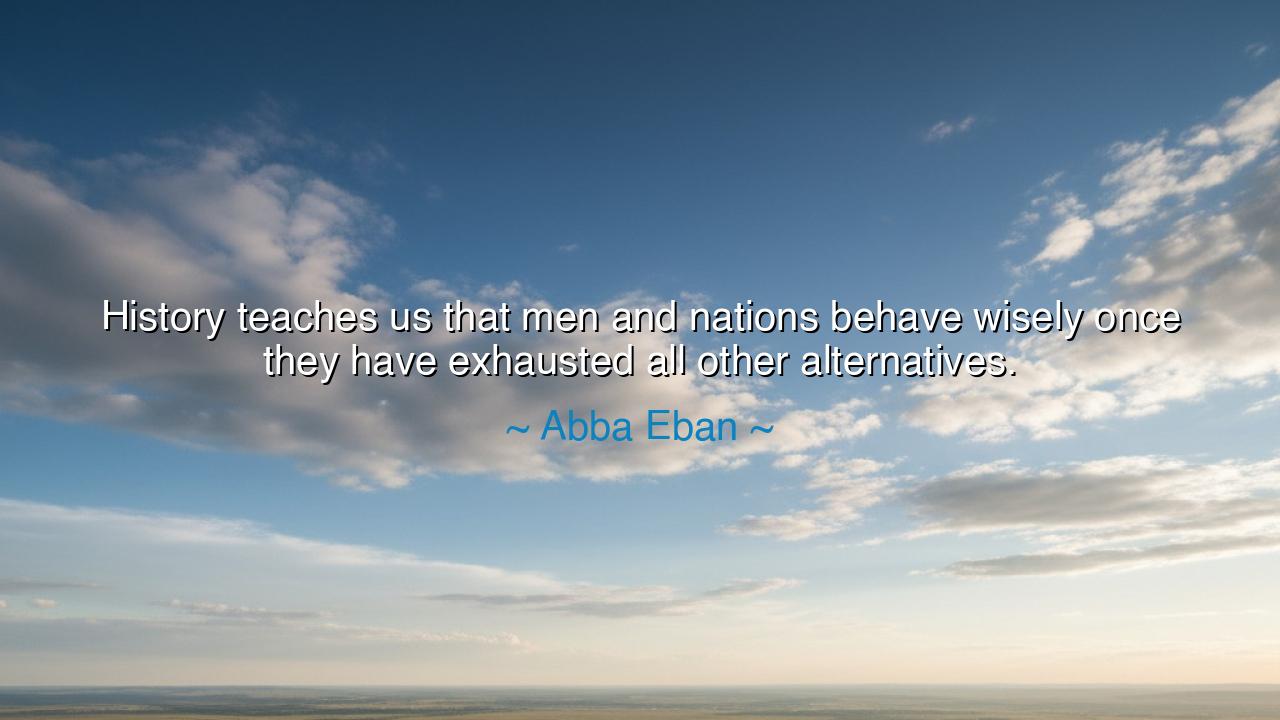
History teaches us that men and nations behave wisely once they
History teaches us that men and nations behave wisely once they have exhausted all other alternatives.






In the annals of wisdom, few sayings carry the weight of irony and truth as deeply as the words of Abba Eban: “History teaches us that men and nations behave wisely once they have exhausted all other alternatives.” These words are both a lament and a revelation. They speak of the stubbornness of humankind—how we often stumble through error and folly before embracing reason. Yet they also hold within them a strange, redeeming hope: that though we may wander through chaos and conflict, wisdom remains our final destination. When the fires of arrogance, greed, and pride have burned themselves out, the ashes give birth to understanding.
In the voice of History, we hear this lesson repeated across ages and empires. Kingdoms rise and fall, not for lack of knowledge, but for the refusal to learn until forced by ruin. Men, like nations, cling to comfort, to false certainties, until pain teaches what peace could not. Abba Eban, a diplomat and scholar of Israel, spoke these words not from despair, but from the long observation of humanity’s cyclical awakening. In his time, he saw nations waging wars to defend pride, only to later sign treaties in humility. He knew that wisdom often arrives late, but it does arrive—born from the exhaustion of every lesser path.
Consider the great cataclysm of the Second World War, the most terrible storm mankind ever conjured. For years, nations ignored the gathering thunder. The lessons of the past were cast aside for ambition and hate. Peace was offered, then rejected. Treaties were made, then broken. And only when the world lay in ruins—when cities burned and millions perished—did humanity finally grasp the necessity of unity. Out of that devastation rose the United Nations, an imperfect yet noble attempt to preserve peace among peoples. Thus Eban’s words were proven: mankind behaved wisely, but only after all other alternatives—violence, denial, isolation—had been exhausted.
Yet this truth is not confined to the grand theatre of nations; it plays out in the hearts of men as well. How often do we, in our personal struggles, resist the path of wisdom until pain humbles us? We cling to habits that harm us, to pride that blinds us, to fears that enslave us. Only when we have tried every fruitless course—when exhaustion breaks the arrogance of the will—do we turn inward and hear the quiet voice of understanding. The lesson of History is also the lesson of the soul: sometimes we must lose much before we learn to see clearly.
But we need not despair at this human tendency. For though it is tragic, it is also a testament to our resilience. The power of humanity lies not in perfection, but in its capacity for rebirth. Out of error comes enlightenment; out of failure, transformation. When Abba Eban spoke of this paradox, he revealed a deeper mercy in the pattern of existence: that even the folly of nations can become the seed of wisdom, and even the stubborn heart can awaken to truth after all else has failed.
The ancient philosophers understood this cycle well. The Greeks taught that suffering is the teacher of wisdom. The Romans believed that nations grow great through trial. And the prophets of every age cried out that repentance is born in the dust of downfall. Eban’s insight is but a modern echo of these timeless truths. It is not the fall that defines us, but what we learn in rising again. The wise do not curse the struggle—they honor it as the forge of understanding.
So, my children, take heed of this lesson written in the blood and tears of history: do not wait until every alternative is exhausted before choosing the path of wisdom. Learn from the mistakes of others; listen to the quiet warnings of conscience before the loud cry of consequence. Be humble enough to change before the world compels you to. In your homes, in your nations, and in your hearts—choose understanding while peace is still possible.
For the cycle need not be endless. The truly wise are those who learn from the ashes without needing the fire. The truly free are those who seek truth before desperation forces them toward it. Let us, then, be among the few who behave wisely before all else has failed—that history may remember us not as those who learned too late, but as those who, at last, listened in time.






AAdministratorAdministrator
Welcome, honored guests. Please leave a comment, we will respond soon